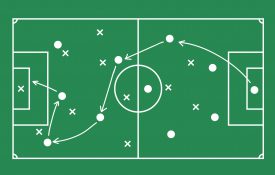-

When Deciding How to Bet, Less Detailed Information May Be Better
People are worse at predicting whether a sports team will win, lose, or tie when they bet on the final score than when they bet on the overall outcome, according to a new study published
-
A Good Meal: The Science of Savoring
There’s nothing I like more than sharing a good meal with friends and family. I like everything about it—the shopping for fresh ingredients, the chopping and cooking, and most of all, the mindful savoring and good conversation at the table. If I have time. Which I don’t many days, and I confess that on those days, dinner is often as not a salad or sandwich on my lap, as I watch NCIS reruns. I know this is a bad habit, but it’s just easier not to fuss. A lot of people are opting out of traditional meals in this way. Indeed, one study says that more than half of Americans’ meals are now eaten in a room with the TV on.
-
How to Perform in a Clutch
TIME: Life is full of vulnerable moments — occasions when we feel off-balance, unsure of ourselves and our abilities — and in these moments we are likely to perform less well than we might. Social psychologists have developed a simple activity, called a values affirmation, that can intervene in such situations to restore our sense of equilibrium. Here’s how it works: Make a list of the values that matter most to you, or for 10 minutes, write in-depth about a value that is central to your life. Perhaps it’s your close relationship with your family, or your skill with a camera or in the kitchen, or your strong religious faith. What matters is that it’s your value, your identity. ...
-
Study: Math Skills at Age 7 Predict How Much Money You’ll Make
The Atlantic: So far as we're able to predict a child's likelihood of leading a successful life, it's no secret that the assets we're born with (intelligence) or into (socioeconomic status) are important. But to what extent do learned abilities, like basic academic skills, fit into that equation? This study defines success in terms of socioeconomic status. Stuart Ritchie and Timothy Bates, of the University of Edinburgh, used data from a cohort of over 17,000 residents of England, Scotland, and Wales who were followed from when they were born to the present day, over 50 years later. Read the whole story: The Atlantic
-
New Research From Psychological Science
Read about the latest research published in Psychological Science. Object-Based Attention Without Awareness Liam J. Norman, Charles A. Heywood, and Robert W. Kentridge Attentional selection can facilitate the processing of basic properties of unseen stimuli; however, it is still unknown whether this selection extends to more complex properties of stimuli. Participants performed a task in which a cue appeared inside one of two rectangles that were masked from their conscious attention. After the cue, a target appeared in one of the masked rectangles. Participants processed targets appearing within the same rectangle as the cue more rapidly than they processed targets in the other rectangle.
-
Weight Gain Tied To Personality Changes, Impulsivity: Study
The Huffington Post: Your weight may be linked with your personality, according to a new study published in the journal Psychological Science. Researchers from the Florida State University College of Medicine and the National Institutes of Health found that people who have experienced weight gain were more likely to be both impulsive and deliberate in their actions. "If mind and body are intertwined, then if one changes the other should change too," study researcher Angelina Sutin, of the Florida State University College of Medicine, said in a statement.

